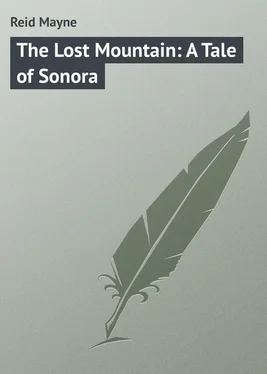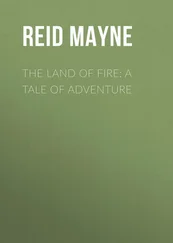Mayne Reid - The Lost Mountain - A Tale of Sonora
Здесь есть возможность читать онлайн «Mayne Reid - The Lost Mountain - A Tale of Sonora» — ознакомительный отрывок электронной книги совершенно бесплатно, а после прочтения отрывка купить полную версию. В некоторых случаях можно слушать аудио, скачать через торрент в формате fb2 и присутствует краткое содержание. Жанр: foreign_prose, foreign_children, на английском языке. Описание произведения, (предисловие) а так же отзывы посетителей доступны на портале библиотеки ЛибКат.
- Название:The Lost Mountain: A Tale of Sonora
- Автор:
- Жанр:
- Год:неизвестен
- ISBN:нет данных
- Рейтинг книги:5 / 5. Голосов: 1
-
Избранное:Добавить в избранное
- Отзывы:
-
Ваша оценка:
- 100
- 1
- 2
- 3
- 4
- 5
The Lost Mountain: A Tale of Sonora: краткое содержание, описание и аннотация
Предлагаем к чтению аннотацию, описание, краткое содержание или предисловие (зависит от того, что написал сам автор книги «The Lost Mountain: A Tale of Sonora»). Если вы не нашли необходимую информацию о книге — напишите в комментариях, мы постараемся отыскать её.
The Lost Mountain: A Tale of Sonora — читать онлайн ознакомительный отрывок
Ниже представлен текст книги, разбитый по страницам. Система сохранения места последней прочитанной страницы, позволяет с удобством читать онлайн бесплатно книгу «The Lost Mountain: A Tale of Sonora», без необходимости каждый раз заново искать на чём Вы остановились. Поставьте закладку, и сможете в любой момент перейти на страницу, на которой закончили чтение.
Интервал:
Закладка:
Who? Opatas? Not likely. Sons of toil — Indicos mansos – slaves, as these the bravos , their kindred only in race, scornfully call them – the Opatas keep to their towns, and the patches of cultivation around them. Improbable that they should have ventured into that wilderness so far from home. More likely it is a party of palefaces; men in search of that shining metal which, as the Apaches know, has often lured their white enemies into the very heart of the desert, their own domain, and to destruction – themselves the destroyers. If the smoke of those camp fires they now see be over such a party, then is it doomed – at least so mentally resolve the red centaurs, hoping it may be thus.
While still gazing at the blue cloud, taking its measure, and discussing the probabilities of who and what sort of men may be under it, another appears before their eyes; this whiter and of smaller size – a mere puff suddenly rising over the crest of the mesa , and separating from it as it drifts higher.
From the fire of a gun, or guns, as the Coyoteros can tell, though not by any crack of one having reached their ears, since none has. In the rarefied atmosphere of the high-lying llanos the eye has the advantage of the ear, sounds being heard only at short distance. They are still more than ten miles from the mountain, and the report of a cannon, discharged on its summit, would be barely audible to them.
Still staying at halt, but keeping to their horses, the chief and others in authority enter into consultation. And while they are deliberating on the best course to be pursued, still another puff of smoke shoots up over the mesa , similar to that preceding, but at a different point. It aids them in coming to conclusions; for now they are sure there is a camp of palefaces by the pond; and they above are hunters who have gone up to get game, which the Indians know to be there in abundance.
But what sort of palefaces? Of this they are not sure. Knowing it to be a miners’ camp, they would ride straight on for it, in gallop. But it may be an encampment of soldados , which would make a difference. Not that the Coyoteros are afraid to encounter Mexican soldiers – far from it. Rather would they rejoice at finding it these. For their tribe, their own branch of it, has an old score against the men in uniform; and nothing would please them better than an opportunity to settle it. Indeed, partly to seek this, with purposes of plunder combined, are they now on the war-trail . Only in their mode of action would there be a difference, in the event of the encampment turning out to be occupied by soldados . Soldiers in that quarter should be cavalry, and to approach them caution would be called for, with strategy. But these red centaurs are soldiers themselves – veterans, skilled, cunning strategists – and now give proof of it. For the time has come for them to advance; which they do, not straight forward nor in single body, but broken into two bands, one facing right, the other left, with a design to enfilade the camp by approaching it from opposite points. Separating at the start, the two cohorts soon diverge wide apart, both making for the mountain, but with the intention to reach its southern end on different sides.
If the black vultures, still in streaming flight above, have hopes of getting a repast there, they may now feel assured of its being a plenteous one.
Chapter Seven.
Los Indios!
Parting from the despised carcase of the ram the hunters press onward, the younger with mental resolve to return to it, come back what way they will. Its grand spiral horns have caught his fancy: such a pair would grace any hall in Christendom; and, though he cannot call the trophy his own, since it fell not to his gun, he intends appropriating it.
Only for a brief moment does the young Englishman reflect about them; in the next they are out of his mind. For, glancing at the Mexican’s face, he again sees that look of anxious uneasiness noted before. It had returned soon as the exciting incident of the sheep-shooting was over. And knowing the cause, he shares it; no more thinking about the chase or its trophies.
They say but little now, having sufficient work to occupy them without wasting time in words. For beyond the opening where the carneros were encountered, they find no path – not so much as a trace made by animals – and have to make one for themselves. As the trees stand close, with lianas interlacing, the Mexican is often compelled to use his macheté for hewing out a passage-way; which he does with an accompaniment of carrambas ! thick as the underwood he chops at.
Thus impeded, they are nearly an hour in getting through the chapparal , though the distance passed is less than the half of a mile. But at length they accomplish it, arriving on the mesas outer edge, close to that of the cliff. There the tall timber ends in a skirting of low bushes, and their view is no longer obstructed. North, east, and west the llano is under their eyes to the horizon’s verge, twenty miles at least being within the scope of their vision.
They aim not to scan it so far. For at a distance of little more than ten they observe that which at once fixes their glance: a dun yellowish disc – a cloud – with its base resting upon the plain.
“Smoke, no – but dust!” exclaims the gambusino , soon as sighting it; “and kicked up by the heels of horses – hundreds of them. There can be nothing else out there to cause that. Horses with men on their backs. If a caballada of wild mustangs, the dust would show more scattered. Indios, por cierto! Carra-i !” he says in continuation, the shade on his brow sensibly darkening, as with a quick glance over his shoulder he sees real smoke in that direction. “What fools we’ve been to kindle fires! Rank madness. Better to have eaten breakfast raw. I myself most to blame of any; I should have known the danger. By this they’ll have spied our camp smoke – that of our shots, too. Ah, muchacho ! we’ve been foolish in every way.”
Almost breathless from this burst of regret and self-recrimination, he is for a while silent; his heart beating audibly, however, as with gaze fixed on the far-off cloud, he endeavours to interpret it. But the dark cloud soon becomes less dense, partially dispersed, and under it appears something more solid; a clump of sombre hue, but with here and there sparkling points. No separate forms can as yet be made out; only a mass; but for all that, the gambusino knows it to be composed of horses and men, the corruscations being the glint of arms and accoutrements, as the sun penetrates through to them.
“What a pity,” he exclaims, resuming speech, “I didn’t think of asking Don Estevan for the loan of his telescope! If we only had it here now! But I can see enough without it; ’tis as I feared. No more hunting for us to-day; but fighting ere the sun goes down – perhaps ere it reach meridian. Mira ! the thing’s splitting into two. You see, señorito?”
The señorito does see that the dust-cloud has parted in twain, as also the dark mass underneath. And now they can distinguish separate forms; horses with men on their backs, and a more conspicuous glittering of arms, because of their being in motion.
“Ah, yes!” adds the Mexican, with increased gravity of tone, “ Indios bravos they are, hundreds of them. If Apaches, as sure they must, Heaven help us all! I know what they mean by that movement. They’ve sighted the camp smoke, and intend coming on along both sides of the Cerro. That’s why they’ve broken into two bands. Back to camp, as fast as our legs can carry us! We’ve not a minute – not a second – to lose. Vamos !”
Читать дальшеИнтервал:
Закладка:
Похожие книги на «The Lost Mountain: A Tale of Sonora»
Представляем Вашему вниманию похожие книги на «The Lost Mountain: A Tale of Sonora» списком для выбора. Мы отобрали схожую по названию и смыслу литературу в надежде предоставить читателям больше вариантов отыскать новые, интересные, ещё непрочитанные произведения.
Обсуждение, отзывы о книге «The Lost Mountain: A Tale of Sonora» и просто собственные мнения читателей. Оставьте ваши комментарии, напишите, что Вы думаете о произведении, его смысле или главных героях. Укажите что конкретно понравилось, а что нет, и почему Вы так считаете.












